- Home
- Julianna Baggott
Girl Talk Page 3
Girl Talk Read online
Page 3
She looked over at me then and she seemed surprised, as if she’d just realized how young I really was. Maybe she thought that she’d made a mistake, that I should be at home reading Nancy Drew mysteries in my canopy bed. She started to cough, stubbed out the cigarette, and then said, “Don’t smoke cigarettes. If I ever catch you smoking, well, that’ll be the end of it, Miss Lissy.”
My mother had the redhead’s address scribbled on a piece of paper that was spread open on her thigh. We were snaking through side streets, my mother squinting up through the windshield. “I can’t see a thing,” she said, changing the subject. “Can you make out any road signs? Do you see Hamilton Avenue?”
I started to get nervous. I had to pee. “Can we stop at a McDonald’s or something?”
“Not in this part of town,” she said. Walpole was rinky-dink at best, with a town common, a few ball fields, houses, barns, and churches, and most of all the stink of chicken farms. New Hampshire is a strange state. I’ve taken an informal poll of people from across the country and asked them what they think of when they think of New Hampshire. They say, “Skiing. Turtlenecks. Nice sweaters. Summer homes on lakes. The primaries. Money. Syrup.” Of course, if they’re from Boston or thereabouts, they know it’s a shabby state of run-down farms, codgers on porches, and county fairs with eight-legged calves soaking in jars of formaldehyde. I was embarrassed when I first went off to college in Baltimore and someone asked where I was from, but then after each glowing response, I realized that nobody seemed to know the truth—that we have the highest alcoholism rate in the nation, for example; that people kill themselves in droves each devastatingly long winter—and I wasn’t going to make anyone the wiser. And no one has ever really caught on. Nashua, for God’s sake, was recently voted the best place to live in the nation. Walpole is your typically trashy New Hampshire town.
I pointed to the sign. “Hamilton Avenue!” And then I slouched down in the seat. “What are you going to say?”
“Oh, don’t you worry. I know exactly what I’m going to say.”
We stopped in front of a town house with empty macramé plant holders swaying in the breeze, two rusty folding chairs sitting on a tiny square of front yard, a cat curled by the front door. My father’s Toyota Corolla was parked in the driveway.
“My God,” my mother whispered. “Jesus.”
And suddenly I saw my father clearly in my mind in bed with a redheaded bank teller, his white hands gripping the pillow beneath her head, his pale body, the taut cords of his neck, her bright hair splayed on the pillow. It was an image that I couldn’t fully understand, but there it was, clearer in my mind than if I’d walked into the room with them.
“Get out of the car,” my mother said. She fiddled with the keys on the ring dangling from the ignition.
“What? What are you going to do?”
She took two keys from the ring and said, “Get in your father’s car, start it up, and put it in reverse. Pull out of the driveway.”
“I can’t drive!” My father had taken me out on a few Saturday afternoons to the church parking lot for driving lessons.
“I’m not asking you to drive. Just pull out of the driveway.”
“And what are you going to do?”
“I’m just going to switch cars with your father, that’s all.”
My father’s car smelled like him, like his aftershave and coffee. The radio came on as soon as I started the engine. It was an old pop song, “Sugar, Sugar” by the Archies, and I knew then that he was a stranger to me, that he was not the man I had known as my father. I wanted to be older, to be a part of that other world just out of reach. And so even from this early point in my father’s betrayal, my overwhelming emotion was not anger at being betrayed but envy. Yes, he was a traitor, but by my teenage definition of the tedious life in Keene, New Hampshire, it was a mutinous situation. I wanted to be the one to disappear down a highway with the radio blaring, “Oh, sugar, sugar,” to be careless and in love.
I put the car in reverse and backed out of the driveway, bumping it off the curb, then yanked it into drive and tugged at the wheel. I watched my mother, white knuckled. She scooted her car in, glancing around excitedly, a cigarette poised between her lips, and she was a stranger to me, too.
My mother jumped into the passenger’s seat and started laughing. “Drive,” she said. “Just drive.”
I stepped on the gas, and the car jerked down the street.
I don’t know how my father got involved with the redheaded bank teller. I admit that there’s only a tiny sliver of this story that I can tell with any precision. I assume that she was a patient, that my mother’s information was right. It had, in fact, led us to the right house. But I can’t imagine his affair had anything to do with the fact that women undressed for him every day. I can see my father having to tell the redhead some sad news, because this was often his job, in his office behind the heavy wooden door. Maybe she began to cry and he comforted her, and there was a connection between them, a mixture of heartache and sympathy and safety. I can only guess.
About four blocks from Hamilton Avenue on our way home, I blew through a stop sign, and my mother took over at the wheel. The Archies had stopped singing “Sugar, Sugar,” and my mother switched off a weekend weather update. It was still dark. We flew by a cop ticketing a convertible. My mother smoked cigarettes, one after another. Neither of us spoke.
When she pulled into our driveway, I asked, “Now what?”
She said nothing and walked into the house. I followed her to the kitchen. She started to brew a pot of coffee, the thin white filter shaking in her hand.
“What’s the rest of the plan? What’s next?”
“Now we sit and wait,” she said.
“For what?”
“Now he knows that I know. Now I wait.”
We both sat down at the kitchen table, the coffeepot gurgled, and my mother stared at me almost desperately, her eyes wide. She glanced around the kitchen, as if she were a lost guide admitting a failing sense of direction. I reached across the table and took her hand, as if I knew just what to do next.
We waited quietly in the kitchen for a couple of hours, and then we went to bed. I lay awake, waiting to hear my father unlock the front door, for the closet to rumble open, his coat to rustle and loose hangers to chime, for the sound of his feet on the stairs, the coins in his pocket jingling. I finally dozed off but kept startling awake all night, wondering if I’d heard the click of the light switch, my father peeing in the bathroom, his whistle as he washed his hands. I convinced myself that it was possible for him not to notice my mother’s car at all, that he could simply drive home almost blind or that the car itself could find its own way to the our house on Pako Avenue like a horse at the end of the workday.
But this is the moment I come up for air, the clearest of my memories: I am staring at the one moonlit wall of my dark room. I stare at that bright square until my eyes sting and tear. I feel the water again, my mother and I, our arms pushing, our legs scissoring beneath us. Each motion takes on a new heaviness—waterlogged, almost leaden. We tread together breathlessly. My father didn’t come home, not that night or the next or the one after that. He disappeared for an entire summer.
3
The redheaded bank teller was a tragic figure even before my mother began collecting all the necessary facts. I suppose she was tragic because I couldn’t imagine someone having an affair with my father just for a romp. He was a serious man, not a drinker or a smoker. He believed in God—although not fervently, as far as I could tell—and I thought that, if my father was having an affair, it was for some almost holy reason, as part of a Catholic outreach program of sorts, not out of passion. He was not a passionate man. He left Fourth of July fireworks displays early to beat the traffic home. And so I figured that the redheaded bank teller was needy and that he was responding to that need.
The first factual thing that I knew about her was from the tattered little note we found slipped under our do
or the morning after my mother’s switcheroo—a dismal failure, in retrospect, an unprecedented miscalculation. The note was written on the back of a receipt for Lucky Stripe chewing gum and eyeliner from The Apothecary, a drugstore on Main Street. It said:
Dear Mrs. Jablonski,
We are leaving town, and so’s not to upset you and Lissy, I am leaving this note. Bobby left instructions at his office for Bonnie and Kay on what to do with his patients and checks and that sort of thing. I guess there’s really not much else to say.
Sincerely,
Vivian Spivy
The “Mrs. Jablonski” was all wrong, of course. My mother took it as a slap in the face. “She’s saying, ‘I’m young and you’re old, Mrs. Jablonski. Old,’ ” my mother said. But I thought the note sounded shy and embarrassed and humble, like the “sincerely.” It was, I think, her way of saying, I’m not trying to take your place. And, now, looking back as an adult, the “Bobby” reference showed a certain naïveté. My mother rolled her eyes when she said it out loud. Calling him “Bobby” was a poor choice in what I had already decided was a string of poor choices Vivian had made, within perhaps a lifetime dedicated to poor choices. She had no idea that my mother never called my father Bobby, that it was a pet name that Vivian had invented, a persona that perhaps he had gotten so attached to that he couldn’t let go of it, that maybe the entire affair had more to do with my father’s being Bobby than it had to do with his love for Vivian Spivy.
I’m not sure why my father didn’t write. It was unlike him, perhaps one of the clearest signs that he’d changed or was trying to change. My mother read the letter that my father had left for Bonnie, his nurse, and Kay, his receptionist. She said it was businesslike, explaining that the leave was indefinite and unexpected and that they’d be compensated. I imagine his not writing to my mother and me—at least a list of instructions on issues of upkeep, house and car and bills—was an act of will. For whatever reasons, he decided not to write, and he doggedly stuck to his decision.
My mother was a detective, wired for gossip, and I didn’t question her sources. There were obviously entire networks, CIA and FBI types of women’s information organizations in Keene. Every day of that first week, my mother came home from the store, the post office, the fabric shop with new information about the redhead: Her parents were dog track bettors with a brood of children ranging from adults to infants; her brothers laid concrete. She’d been taking a class in accounting at Keene State College and had been living with a woman who had fifteen cats. She’d taken tennis lessons that spring through the Department of Parks and Recreation but wasn’t athletically inclined. She was a patient of my father’s. She’d had her tubes tied by another doctor in Boston. She was twenty-four.
My feelings for Vivian Spivy were complex. I’d just started to get all sweaty around boys, and so the visions I had of the naked body of Vivian Spivy were confusing. My feelings for her weren’t really sexual, although they were rooted in sex, sex with my father, but they were feelings of love. It was, actually, a motherly or fatherly (it’s hard to say) kind of love. I wanted to take care of her, to raise her up from dog track bettors and concrete layers. I wanted to give her tennis lessons the way I’d been taught privately on Tuesdays by the aged Mrs. Tutwhiler, who’d once been on the women’s Olympic team. I wanted to brush the cat fur from her clothes and the tangles from her red hair, help her get into a good college, full time. I wanted to untie her tubes and make her a mother, clean and whole and beautiful, like my mother. And I felt guilty about this, because I knew that I shouldn’t love Vivian Spivy, that this love was betraying my mother, just as my father had. I loved Vivian and I hated her, too, for taking my father, for hurting my mother. I hated myself for loving her. I knew that my love for Vivian Spivy wasn’t natural, wasn’t a normal reaction, but there was nothing I could do about it. In retrospect, I believe I was in love with her because that love allowed me to understand my father.
The only therapist I’ve ever had—it was during college at the end of a string of sour romances—said that this love of Vivian allowed me to fantasize being Vivian Spivy, which allowed me to have sex with my father, for whatever that’s worth. I don’t go around saying that when I was a teenager I wanted to have sex with my father. I certainly did not. The mere idea would have made me gag—gagging being popular in the ’80s. But what I’m saying is that my father’s affair and the subsequent events concurring with my sexually impressionable age were not something I overcame easily. These were the kinds of things that force you to rethink every decision from there on out. It was a pivotal moment, a psychoanalyst’s field day.
I’d like to add that the whole Electra complex business is also a result of my generation, my time and place in history. Freud was shoved down my throat. Of course, my generation has been brainwashed to look for cocks and tits masquerading as everyday household items. My sophomore year of high school, a Catholic high school even, I was analyzing vodka ads in a sociology class for genitalia among melting ice cubes. By college, I was trained to actually read sex in the swirled cigarette smoke of a menthol. I knew that, if you fold the Land O’Lakes butter wrapper the right way, the Indian’s knees become nippleless breasts, that Joe Camel’s face was really just a flaccid penis lying on its balls, and that halfway through a certain Mickey Mouse ice pop, you’d find yourself sucking a purple dick. It was a conspiracy theory that made advertisers look like perverted geniuses, which is one of the reasons I like advertising, my chosen career. People of my generation and social and educational background are fluent in cocktail Freudian theory, maybe even are able to speak a little pidgin Jung, enough to throw out the word archetypal. We’re a generation of crackpot analysts, self-analyzing. Imagine the horrifying array of self-haircuts there’d be if we all thought we were professional hair stylists because we owned a pair of scissors. Now replace haircuts with psyches. It’s not a pretty picture. My point is that because my father had an affair, I was forced to think of him sexually, which led to a crackpot diagnosis. It may very well mean nothing. My therapist, by the way, was a troll-like woman who, whenever we approached the subject of sex, had the habit of tugging at her nose, which I—being well trained—thought of as her own little penis. So who’s the stable one?
I was fairly sure that everyone knew what was going on. Mrs. Defraglia came over for unannounced visits and invited the family to a little barbecue for the sole purpose, as far as I could tell, of hearing my mother come up with an excuse to decline. As luck would have it, our bank was the bank that Vivian Spivy worked for. When we went in to check the account and found $1,041 missing—exactly one third of the total—I was convinced that the tellers were whispering, Yes, he took it so he could escape with Vivian, each one of them secretly rooting for Vivian, sizing us up, deciding what we had done to run him off.
My father’s receptionist and nurse called from the office, bewildered by the instructions my father had left them. They wanted to know if it was some kind of joke, not that my father was the joking kind, but neither was he the kind to disappear suddenly. My mother told them that his mother was sick and that he was in Boston, because she’d been asking to see her son.
“She’s an old crow,” my mother said, convincingly irritated. “He could be there for days, weeks. We’ll call it a holiday.”
My Grandmother Tati and Aunt Bobo were a sticking point, however. Tati especially was an intimidating woman. And it was their impending Sunday-night call that my mother most feared. My mother knew that she couldn’t fool them, and that without their boy’s voice, they’d suspect the worst of my mother.
“They’ll think I’ve got him locked up in the basement or something,” my mother said. “They’ll think I’ve killed him. They’ve never liked me.”
On Friday afternoon, I was practicing the clarinet, flipping through a book of popular sheet music, “You Light Up My Life” clipped to my metal music stand. I was a terrible clarinet player, always letting out some dying-duck call, some cats-at-sex squeal. My mo
ther sat on the living-room sofa in front of the bay window to listen. She said it soothed her, but I can’t imagine she was telling the truth. It was hot and she’d drawn the curtains all but an inch or two. Occasionally she’d peer out and shake her head at the sight of Mrs. Defraglia digging in her flower garden in short shorts. Sometimes she’d mutter, “The son of a bitch is in my car with that woman. My car!” As if she’d forgotten that it was her little scheme that had provided him with her car. I had trouble imagining my father in the family car. It seemed so embarrassing to run off with a woman in a station wagon, so middle class and suburban. I felt sorry for them, cruising along interstates in a big boat built for car pooling, not love affairs. I imagined her huddled up against him, trying to make a little nest within the wide body’s bench seat.
“We won’t be here when Tati and Bobo call,” she said finally out of the blue. “He should have to explain himself to his own mother.”
I squeezed out a final wheezy note. “Where will we be?” I asked. I didn’t much care for being fifteen, for the long claustrophobic summer days, and it was only the beginning of summer, the whole lazy vacation stretched out in front of me like a fat lady in a bikini. I was knobby and awkward and had only one friend, Louisa Eppitt, another clarinetist who lived across town in a shabby little house with linoleum peeling up from the floorboards and slit screens, the living room cluttered with broken toasters, radios, clocks, and lamps, what she referred to as her father’s “projects.” Her mother was dead and her father sat in a La-Z-Boy with a cable box duct-taped to its nappy arm. My father’s affair had offered me some much-needed excitement. I didn’t doubt he’d come back eventually. There were moments of reality to the situation, but I had trouble understanding the seriousness. My mother was agitated, eating little, chain smoking. But more than anything, I was curious as to what was going to happen next. And I thought a trip would be good, that when my father pulled into the driveway and plopped down in his own easy chair to catch the next Red Sox game (I fully expected him from one minute to the next), it might do him good if we weren’t there.

 Burn
Burn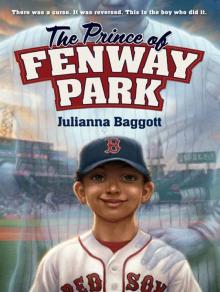 The Prince of Fenway Park
The Prince of Fenway Park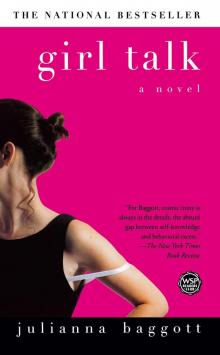 Girl Talk
Girl Talk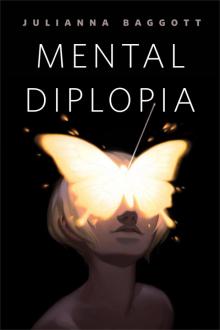 Mental Diplopia
Mental Diplopia Pure
Pure Harriet Wolf's Seventh Book of Wonders
Harriet Wolf's Seventh Book of Wonders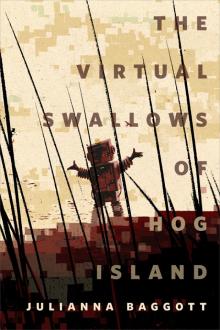 The Virtual Swallows of Hog Island
The Virtual Swallows of Hog Island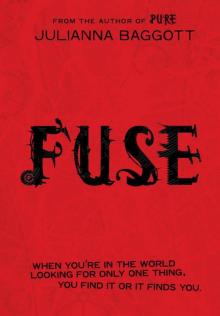 Fuse
Fuse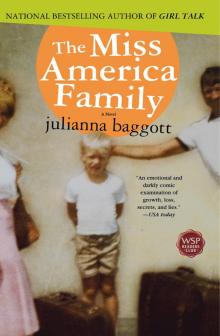 The Miss America Family
The Miss America Family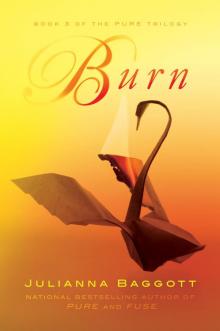 Burn (The Pure Trilogy)
Burn (The Pure Trilogy)